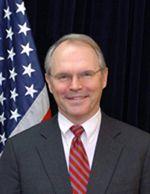Advertisement
Ambassador Hill on Iraq Now

In our first hour today, we reached out to the U.S. Embassy in Baghdad and spoke with Ambassador Christopher Hill. He’s been President Obama’s diplomatic point man in Iraq since April.
Hill said that the key to progress in that country remains reconciling the various political factions. Recent violence has inflamed tensions among them. The Ambassador was candid about the difficult environment.
"Now ironically, it’s the security situation that hits the headlines, the various hideous bombings that one sees," he said. "But it’s the political situation that I think worries a lot of people, because this idea of working together and trying to have rules of the road for the political process is a bit of an elusive concept here."
Hill also commented on the recent formation of a new Shiite alliance, which Prime Minister Maliki has decided to opt out of. He said Maliki is playing a “dating game”:
I want to emphasize that, you know, we have elections coming up. And while Iraqis may have not totally embraced democracy, they sure have embraced politics…So recently you had a sort of Shia grouping put together. Those are people mainly in the South. But interestingly the Shia prime minister, Maliki, put a condition in there that he knew the others would not accept. And so he’s out there playing a sort of dating game with Kurdish partners and Sunni tribal partners. So there’s a lot of politics going on. That’s the good news. The bad news is they sometimes, you know, don’t get to the real homework of reconciliation and working some of these problems.
Asked about the current sentiments of Iraqis toward the American occupation, Ambassador Hill said the "slow" progress remains "frustrating," and he suggested there is only so much the U.S. can do:
We’re into the seventh year of this very difficult period. And to be sure, I think that a lot of Iraqis thought that it would go a lot better, thought that we would essentially bring America to them. And that hasn’t been the case. It’s been very tough. It’s been very tough politically. It’s been very tough to reconcile various sectarian communities. You know, there are many Sunnis who feel that they are the big losers with the demise of Saddam Hussein. Even though they didn’t like him, he was a Sunni. And then frankly there are Shia who feel they are winners, but they always worry about what comes next. So it’s a very nuanced picture. But with respect to the view of the United States, that’s also very complex. There are a lot of Iraqis who feel that it has been such a tough time, that you know, [they say], “Why hasn’t the U.S. completely rebuilt this country?” Well, we have…spent billions of dollars, but to just rebuild Iraq or to somehow turn it into something that never was, would be costing trillions. So we have really tried to work with the Iraqi authorities, tried to stand up a market economy, tried to get them to have a proper use of their natural resources so they can bring in foreign investment and that sort of thing. And there’s no question that progress is being made, but it’s very slow, and it’s very frustrating to a lot of people.
This program aired on September 1, 2009. The audio for this program is not available.